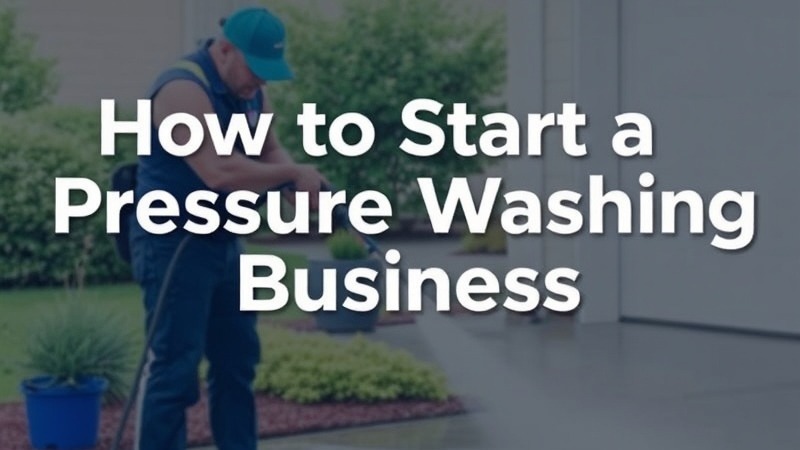
How to Start a Pressure Washing Business: A Comprehensive Guide
Starting a pressure washing business can be a lucrative venture, offering opportunities for financial independence and growth. Whether you're drawn to the satisfaction of renewing surfaces or eager to serve a growing market, this guide will walk you through the essential steps and considerations to ensure your success.
Why Start a Pressure Washing Business?
Pressure washing is a booming industry, valued for its ability to restore surfaces and maintain properties. With low startup costs, flexible scheduling, and high profit margins, it’s an attractive choice for entrepreneurs. But what does it take to start a pressure washing business? Let’s dive in.
Step 1: Research and Plan
Before you begin, research the market in your area. Identify potential customers such as homeowners, businesses, and property managers. Understand the competition and assess demand for services like driveway cleaning, house washing, or commercial pressure washing.
Pro Tip: Use online tools to conduct market research and find your niche.
Step 2: Create a Business Plan
A solid business plan is your roadmap to success. Outline your goals, target market, pricing strategy, and marketing approach. Include projected costs and revenue to gauge profitability.
Step 3: Set Up Your Business Structure
Choose a legal structure for your business, such as a sole proprietorship, LLC, or corporation. This decision affects your taxes, liability, and paperwork. Consult with a professional to determine the best option for you.
Step 4: Obtain Necessary Licenses and Insurance
Check local regulations to determine what licenses or permits are required. Additionally, invest in liability insurance to protect your business and clients.
Step 5: Purchase Equipment and Supplies
To start your business, you'll need essential equipment and supplies:
Pressure Washer: Choose between gas-powered or electric models based on your needs.
Nozzles and Attachments: Ensure you have a variety of nozzles for different surfaces.
Cleaning Chemicals: Stock up on eco-friendly solutions for tough stains.
Safety Gear: Invest in gloves, goggles, and non-slip boots.
Pro Tip: Budget for high-quality equipment to avoid frequent repairs.
Step 6: Develop Effective Systems and Processes
Streamline your operations with tools like scheduling software, invoicing systems, and time tracking apps. These systems save time and help you manage your business more efficiently.
Step 7: Create a Marketing Strategy
Build a strong online presence with a professional website, social media profiles, and local SEO. Consider strategies like:
Google My Business for local visibility.
Facebook ads to reach homeowners.
Partnerships with real estate agents or contractors.
Pro Tip: Share before-and-after photos of your work to attract customers.
Step 8: Build a Strong Client Base
Start by offering your services to friends and family, then expand through word-of-mouth referrals. Joining local business networks can also help you establish connections.
Step 9: Price Your Pressure Washing Services
Pricing depends on your market, service area, and competition. Charge based on square footage, job complexity, and equipment costs. Aim for rates that cover expenses while ensuring profitability.
Pro Tip: Offer package deals for recurring clients to boost loyalty.
Step 10: Maintain Your Equipment
Regular equipment maintenance is crucial for delivering quality results. Follow a step-by-step inspection checklist to ensure your pressure washer and tools are in top condition.
How Much Does It Cost to Start a Pressure Washing Business?
Startup costs typically range from $2,000 to $10,000, depending on equipment quality and licensing fees. Starting small and scaling as your business grows is a practical approach.
Is Pressure Washing a Profitable Business?
Yes! With low operating costs and high demand, pressure washing can be highly profitable. Focus on building a solid reputation and offering exceptional service to maximize your earnings.
Final Thoughts
Starting a pressure washing business requires careful planning, the right equipment, and a commitment to excellent service. With the steps outlined in this guide, you’re well on your way to launching a successful business. Embrace the opportunity to transform properties and build a thriving company.
Witness the magic of pressure washing and enjoy the satisfaction of helping clients maintain beautiful properties. Ready to get started? Take the first step today and turn your passion into profit!
 Add Row
Add Row  Add
Add 

 Add Row
Add Row  Add
Add 



Write A Comment